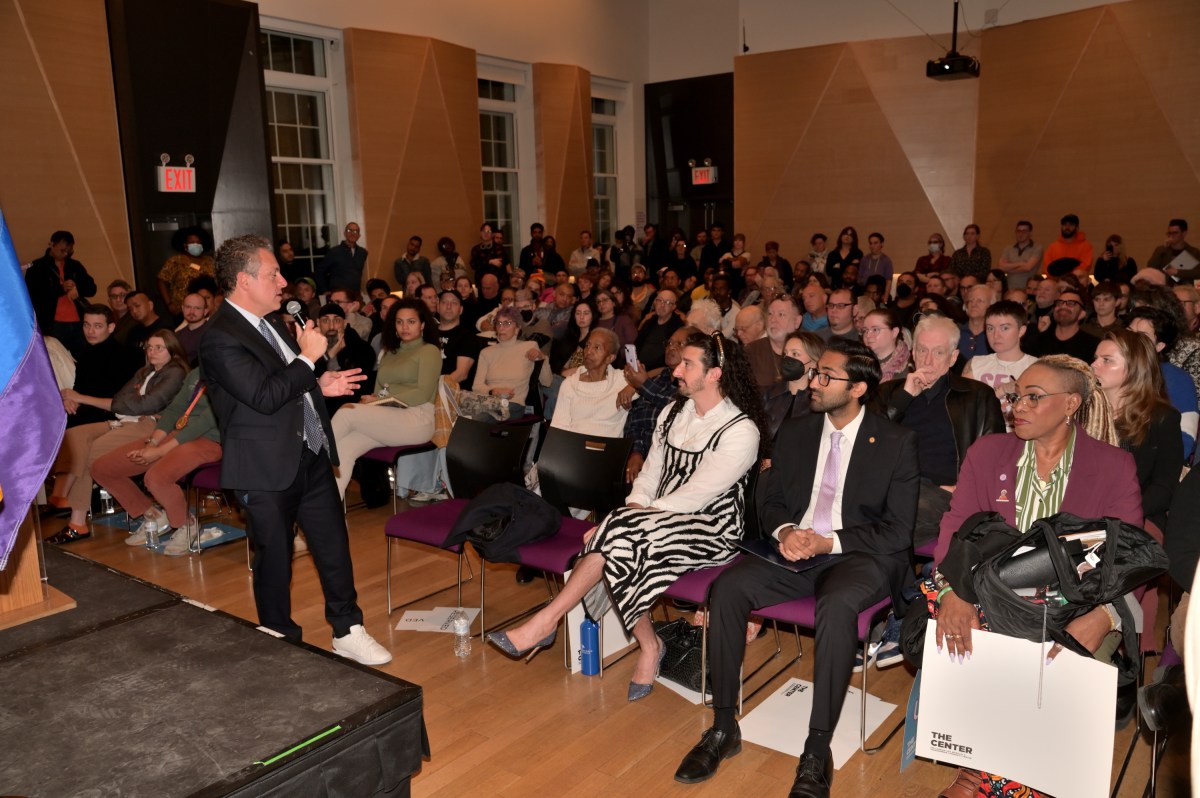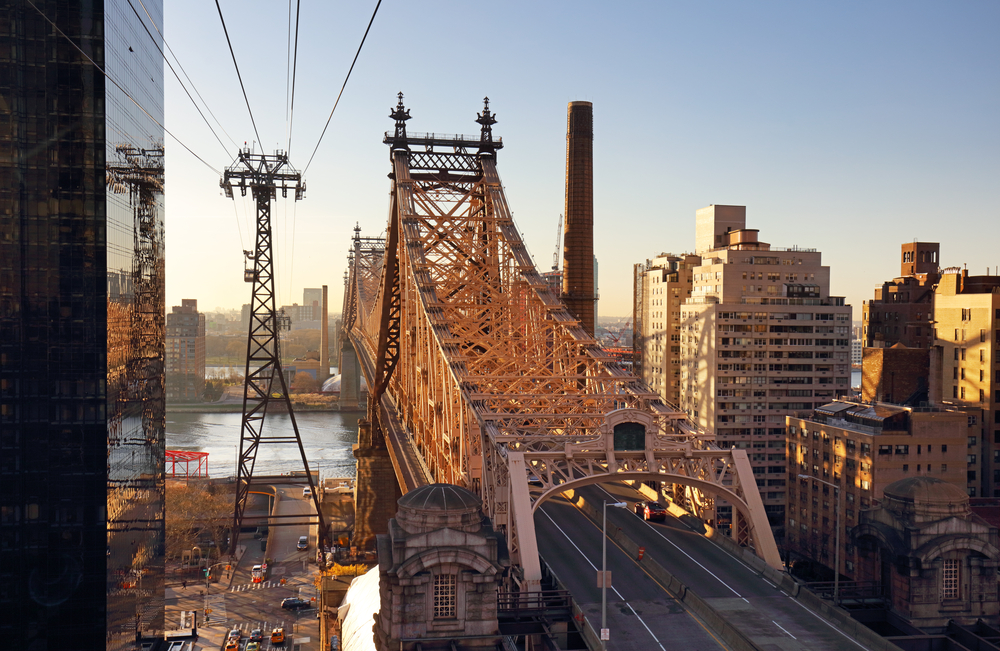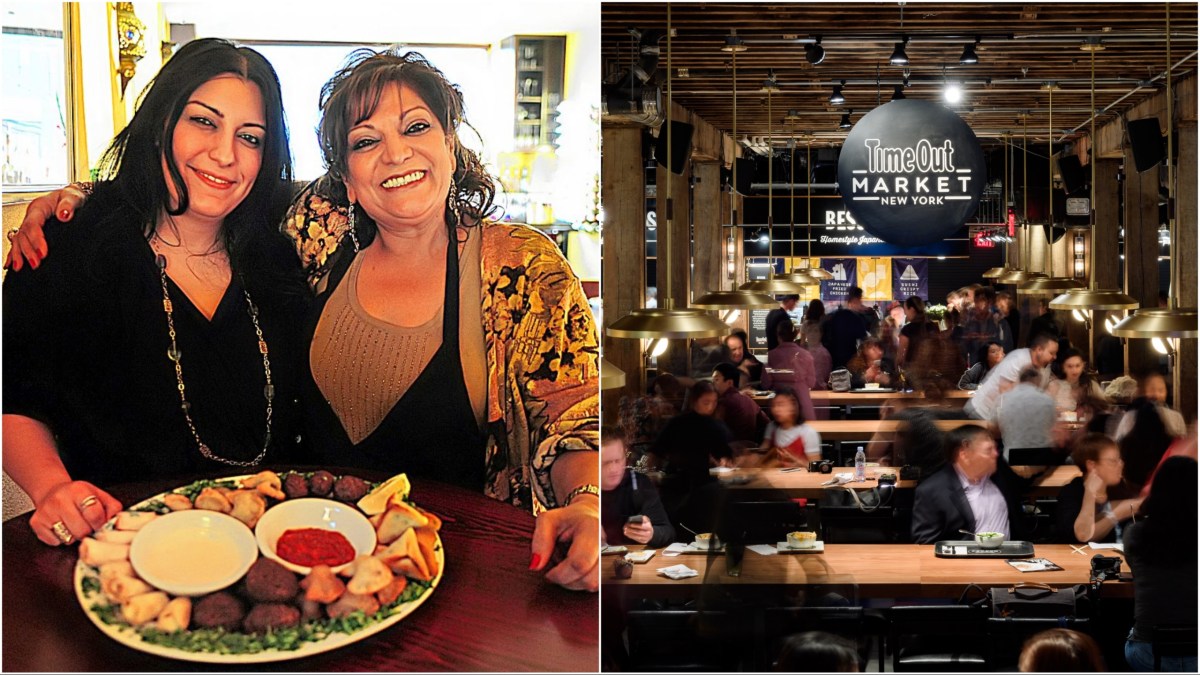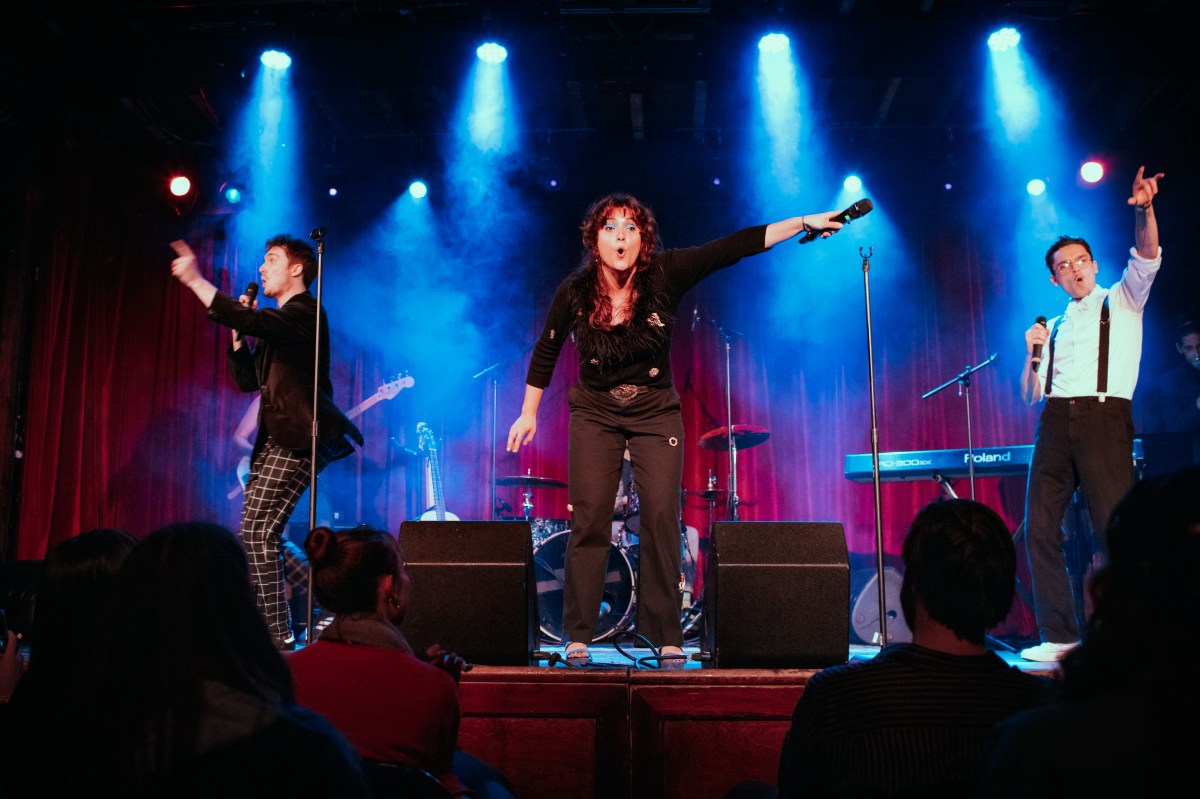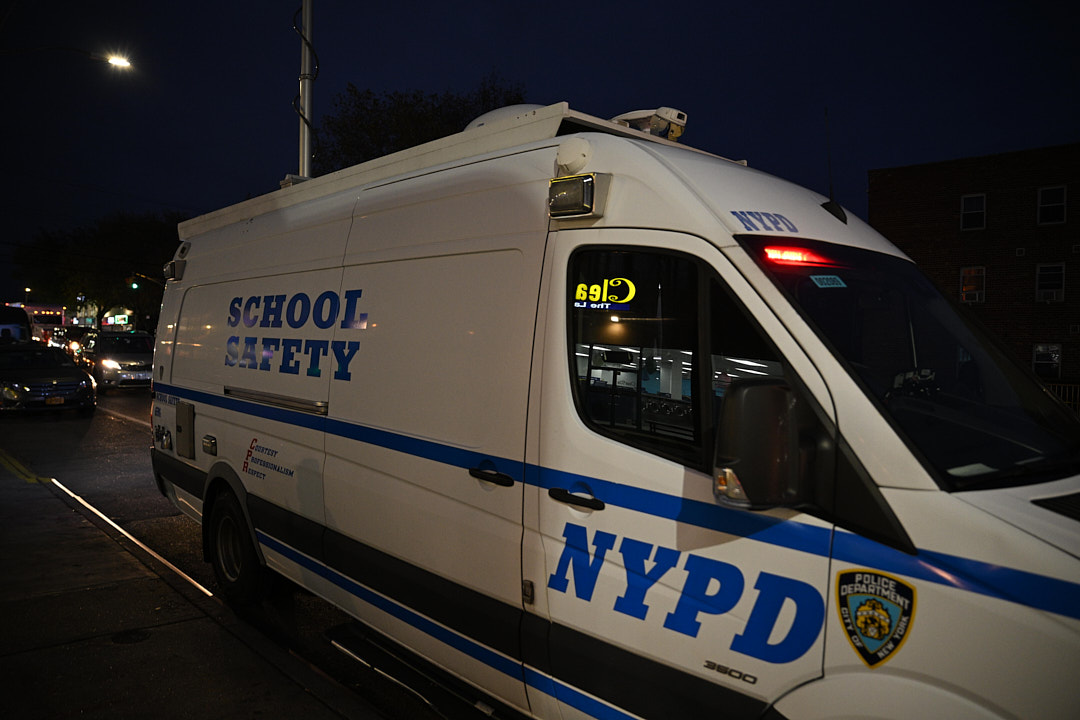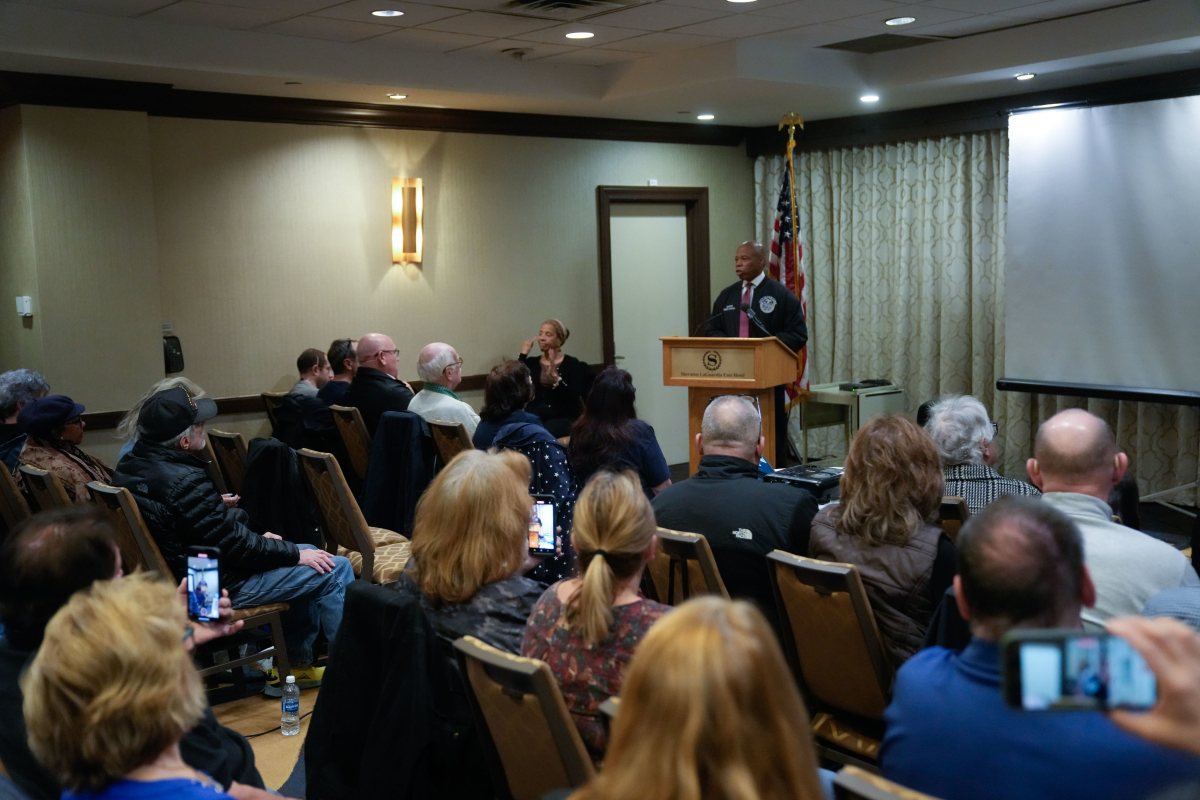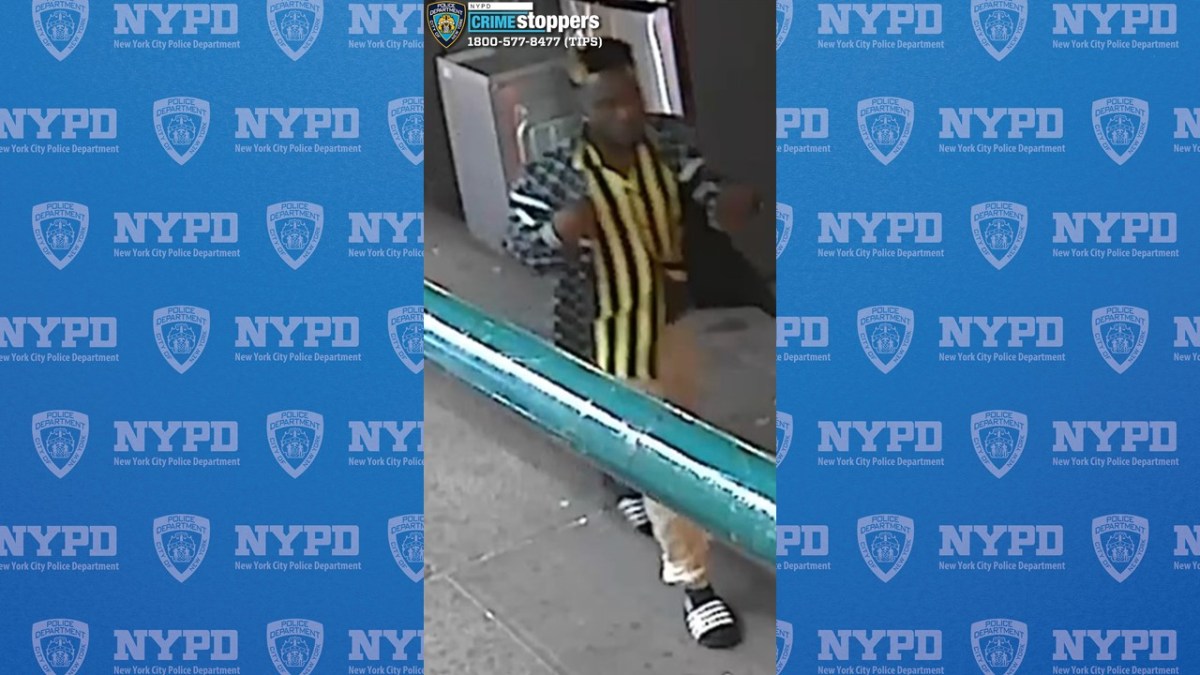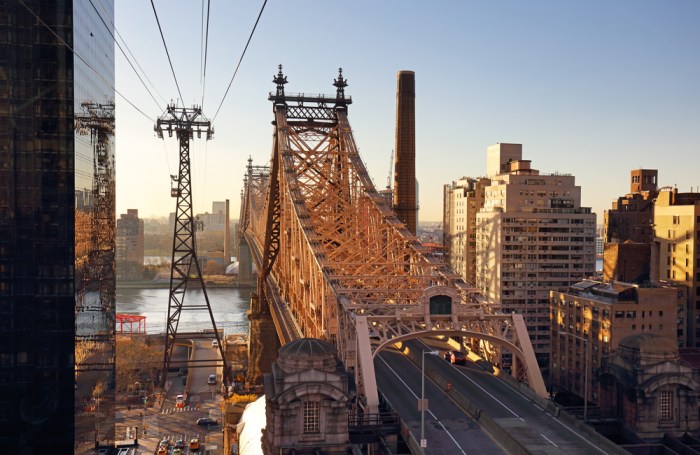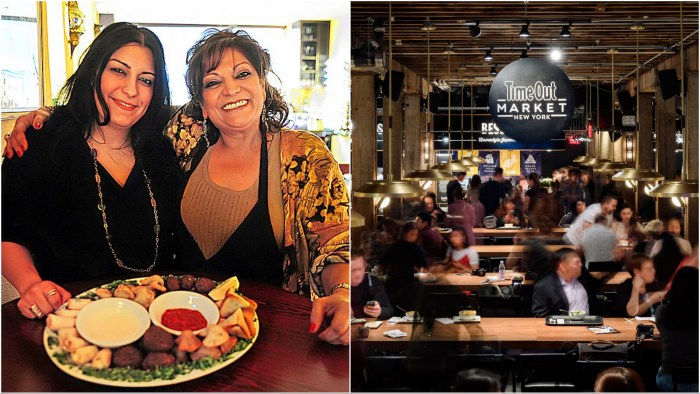By ANDY HUMM
Volume 78 – Number 26 / November 26 – December 2, 2008
West and East Village, Chelsea, Soho, Noho, Little Italy, Chinatown and Lower East Side, Since 1933
Council Speaker Christine Quinn was among the speakers at the massive Nov. 15 rally outside City Hall.
Just three days after 10,000 marched on the Mormon Temple near Lincoln Center to denounce the passage of Proposition 8 — a campaign largely funded by Mormons — another crowd estimated up to 10,000 assembled along Broadway by City Hall on Sat., Nov. 15, to decry the elimination of gay marriage rights in California. The protesters also pressed their demand that the New York State Senate pass Governor David Paterson’s marriage-equality bill that passed the Assembly last year.
The City Hall protest was just one of 300 such simultaneous demonstrations in every state and several foreign countries conceived 10 days earlier by Amy Balliet, a 26-year-old Seattle resident, who, in the wake of the California defeat, put up the JointheImpact.com Web site to discuss what needed to be done. The Web site’s suggestion to mount a coordinated campaign of street actions was taken up aggressively nationwide by gay netroots — blogs and Internet-based political activist groups. At first, activists in New York thought the call to come to City Hall on a Saturday might result in thousands of people just milling around with handmade signs. But a 17-year-old girl in Connecticut named Emma apparently took it upon herself to organize the New York action and was quickly overwhelmed with the response. Five young neophyte activists, none of whom had known each other, connected on Facebook and took up the challenge of giving some shape to the New York demonstration. “We took the initiative,” said Evan Terry, 20, one of the lead organizers. “Every one of us is 22 or under.”
In his address to the crowd on Nov. 15, Terry asked for a minute of silence for “those who were married in California and had their rights taken away.”
California Attorney General Jerry Brown, a Democrat, has opined that the 18,000 same-sex marriages performed during the five months they were legal are still legal, but that has yet to be adjudicated. The state’s Republican governor, Arnold Schwarzenegger, has voiced agreement with Brown. The five young organizers met each other at a Starbucks on Mon., Nov. 10, hooked up with the leaders of the groups Marriage Equality/NY and the Wedding Party, enlisted 150 volunteers through social networking Web sites, rented a stage and sound system, and secured a lineup of politicians, activists and the New York City Gay Men’s Chorus for a program. Heath Tucker, 22, another of the lead group, said this action marked a “passing of the torch” to his generation of activists. Carrie Harrington, also with the five, said it was her first demonstration. “Yes We Can!” and “Yes We Will!” were the most common refrains at the rally, picking up on President-elect Barack Obama’s campaign themes.
The big story, then, in New York and everywhere else these actions occurred, was not so much what was said or done at city halls and civic centers, but how they came together in a movement that has not, in recent memory, produced anything like these outpourings in terms of size and swiftness of organization. Whether the effort can be sustained and be effective in achieving such goals as marriage equality and more remains to be seen, but it has already revolutionized who speaks for the lesbian, gay, bisexual and transgender movement and how. No one is in charge — and everyone is, an ethos ACT UP adopted in the pre-Internet late 1980s. Balliett, who had married her partner in California prior to the elimination of that right, wrote on her site after the actions, “Last week, some felt angry. Last week, some felt defeated. Last week, some felt hopeless. Today we have shown the world that we will not be victims anymore! Today, our community has risen and shown our opponents that we are MUCH MORE THAN 1 MILLION STRONG! We brought the world’s attention to the outrage that is Proposition 8.” California activists in London held up signs outside the U.S. Embassy proclaiming, “Proud of My Country, Ashamed of My State.” Actress and comedian Wanda Sykes came out publicly at the Las Vegas rally. There were as many as 25,000 marching in San Diego and as few as seven in Montgomery, Ala., but they were everywhere, especially throughout California, where demonstrations have taken place almost continuously since the vote. The New York action was massive but surprisingly orderly, with demonstrators penned in by police barricades that gave them a long strip of sidewalk and one lane of Broadway from the southern tip of City Hall Park up five blocks to Chambers St. The protest featured an invocation by a minister and then the singing of the national anthem by the Gay Men’s Chorus, not the usual fare at L.G.B.T. demonstrations, but also not something that seemed to bother the crowd, many of whom — like some of the organizers — were participating in their first public action of this kind. Urvashi Vaid, former director of the National Gay and Lesbian Task Force, recalled organizing 50 state actions for L.G.B.T. rights in 1998 through the task force’s Policy Institute. She remarked on how “cumbersome” and long the process was pre-Internet. “It feels so amazing to know there is a new wave coming up and to see so many straight people a part of it,” Vaid said.
There were no counter-demonstrators in New York as there were in Salt Lake City, where this issue has reached a particularly high intensity over the involvement of Mormons in Proposition 8’s passage. After the proposition’s passage, the Church of Jesus Christ of Latter-Day Saints issued a statement saying it “does not object to rights for same-sex couples regarding hospitalization and medical care, fair housing and employment rights, or probate rights, so long as these do not infringe on the integrity of the traditional family or the constitutional rights of churches,” the Salt Lake Tribune reported. In New York, the focus was on the Republican-controlled State Senate’s refusal to vote on marriage equality. And while it is hoped that the Democratic takeover of that body for the first time in 43 years bodes well for opening marriage to same-sex couples, Bronx Senator Ruben Diaz, Sr., a virulent anti-gay campaigner, is among three Democratic holdouts who have not yet given their support to Democratic Senate Leader Malcolm Smith, of Queens, to ensure that he becomes the Senate’s majority leader in January. The rebel Democrats’ motives and goals are not fully clear, but Diaz has stated that he wants an assurance that either the same-sex marriage bill will not be brought to the Senate floor for a vote or that a statewide referendum will be held on the question. Neither of those options seems politically possible, so the stalemate that began with Democratic gains in the State Senate on Election Day continues. Activist and attorney Jeff Campagna urged the crowd at the New York rally to put Diaz’s phone number — 718-991-3161 — in their cell-phone address books, text it to all their friends, and phone Diaz to demand he support Smith. “This is the first time since the murder of Matthew Shepard [in 1998] that we have come together in force for our rights,” he said, calling Diaz the “main obstacle” to gay marriage rights. Alan Van Capelle, executive director of the Empire State Pride Agenda, New York’s gay rights lobby, wasn’t at the New York action himself, but his partner and friends were.
“I’m completely excited by all the energy. It’s really hopeful and terrific,” he said. He emphasized that no one group “owns” the marriage issue, and that his group is doing all it can to get marriage equality through the State Senate. “It’s exciting to see people out in the streets in such numbers,” said Tom Keane, an attorney and ACT UP veteran. “I hope it can be held together.”
The crowd was urged to go to the Marriage Equality/NY meeting at the L.G.B.T. Community Center on Mon., Nov. 24, at 6 p.m. and to keep up with future actions through JointheImpact.com and their Facebook groups. There was talk of staging actions every two weeks. Politicians who took the stage to speak out for marriage equality included out lesbian City Council Speaker Christine Quinn; a potential 2009 opponent of Quinn’s in her Village-Chelsea-Hell’s Kitchen district, Yetta Kurland; Manhattan Borough President Scott Stringer; veteran out Assemblymember Deborah Glick, of the West Village, and her colleague Daniel O’Donnell, an Upper West Side assemblymember who got the bill opening marriage to gay couples through the Assembly last year. Also speaking was Congressmember Anthony Weiner, a Democrat running for mayor next year against Republican-turned-independent Mike Bloomberg. The mayor did not attend, which was probably just as well, since Bloomberg led the city in successfully appealing the only positive ruling on marriage equality issued by a New York court. The mayor donated hundreds of thousands of dollars in an unsuccessful effort to keep the antigay majority in power in the State Senate. “Anybody who thinks God hates gays,” Quinn told the crowd, “should look at the weather.” The rally was indeed preceded by a downpour that might have dampened turnout but did not, as the sun broke out by around noon. And it didn’t start drizzling again until the massive demonstration was over.Facebook generation generates the protests over Prop. 8














